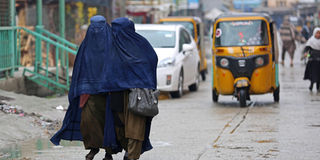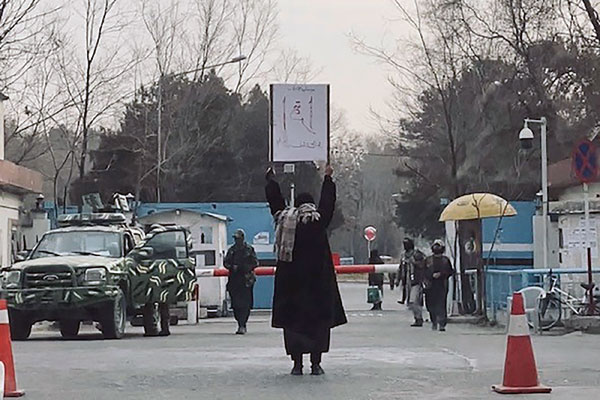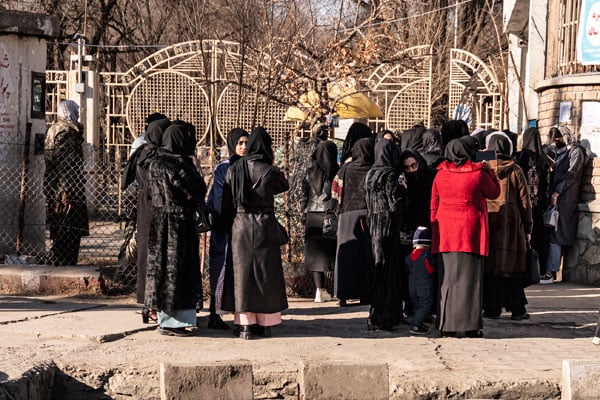Prime
The Taliban can’t defeat women

Afghan women in Kabul yesterday. The Taliban-led government has squeezed women out of almost all areas of public life such as education. PHOTO | AFP
What you need to know:
The Taliban’s brutal and inhumane treatment of women and girls warrants investigation by an international tribunal, write Gordon Brown & Yasmine Sherif.
In the weeks since the Taliban’s December 2022 decree banning young women from attending university, Afghans have shown that they will not take this latest outrage lying down. Brave female students have launched a campaign of resistance – risking beatings, arrest, or worse – and their male counterparts (and many professors) have shown solidarity by walking out of their exams.
As much as the Taliban tries to crush girls’ and women’s rights, they are unlikely to achieve a final “victory.” Afghan girls and women enjoyed a right to education in the years prior to the Taliban’s return to power in 2021, and now neither intimidation nor prison sentences will silence them. They have experienced what it is to be free, and they will not accept the alternative.
The Taliban have already been warned that if they exclude women from work performed by NGOs providing food and health care, these organisations will have no choice but to leave the country – a message reinforced last week by United Nations Deputy Secretary-General Amina Mohammed.
But another way to effect change is to threaten the Taliban regime with the full force of international law. The Taliban’s brutal and inhumane treatment of women and girls warrants investigation by an international tribunal. The regime is clearly in breach of the international conventions dealing with children’s and women’s rights to which it has agreed. No other country in the world bars women and girls from receiving an education, and no other country has such draconian forms of state-led gender persecution.
I have spoken to many Afghan students in my capacity as UN Special Envoy for Global Education, and words cannot capture the frustration they feel. The world’s poorest and most vulnerable children know that they are now shouldering the heaviest burden in the global fight against one of the greatest injustices of all – the denial of girls’ and women’s rights. Afghan girls have been denied access to schools, banned from public spaces, prevented from traveling without a male escort, and forced to wear burqas that cover them from head to toe.
The university clampdown has been in the offing for some time. After the Taliban takeover in 2021, universities introduced gender-segregated classrooms and entrances, and declared that female students could be taught only by women professors or old men.
Then, in October 2022, the Taliban issued sweeping restrictions on the subjects that women were permitted to study. Veterinary science, engineering, economics, journalism, and agriculture were all deemed off limits.
But the authorities have been sending mixed signals, which suggests that the regime is not united behind the new restrictions.
For example, while thousands of girls and women were allowed to sit for university entrance exams three months ago, that decision was soon followed by one barring them from matriculating. This likely speaks to a tension between the religious leadership and an education ministry that would prefer to see girls in the classroom rather than sitting at home.
Regime divisions
Divisions within the regime are also reflected in the unevenness of policy implementation. In some parts of the country, education is continuing underground or in home schools, with little resistance from the authorities, and in other areas, girls are still allowed to attend regular schools, in open defiance of the Taliban’s injunctions.
One can also infer internal fissures from the ban on women NGO workers, a policy that the minister of public health claims does not apply to the health sector.
These examples all suggest that the authorities are not legislating from a position of strength. Rather, they are acting out of fear of women’s empowerment.
After all, there is no other credible justification for such policies. Islam encourages education, and all of Afghanistan’s neighbors offer schooling for girls. They understand that girls’ education is not only in line with Islamic teaching but also essential to economic prosperity.
Moreover, Afghanistan itself has a history of benefiting from girls’ education. The country’s own past shows that if the Taliban continue down the road of repression, Afghans will have only half the doctors, nurses, and teachers they need. And if half of Afghanistan’s human capital has been squandered, the economy, which desperately needs to be rebuilt, will remain among the worst-performing in the world.
During my many pre-2021 visits to Afghan schools where girls were being taught, I saw firsthand that there was widespread enthusiasm for universal education, both in rural areas as well as the cities. The Taliban’s many bans fly in the face of fundamental human aspirations. People everywhere want more freedom, not less.
The Taliban’s policy on girls’ and women’s education represents neither the real Afghanistan nor the true Islam. It is urgent that the international community, and especially the Muslim world, come together to support young Afghan women as they stand up for their rights.
Gordon Brown, a former prime minister of the United Kingdom, is Chair of Education Cannot Wait’s High-Level Steering Group. Yasmine Sherif is Director of Education Cannot Wait.
UN highlights ‘huge step backwards’ for afghan women
BY afp
Apparent exemptions granted by the Taliban to harsh restrictions placed on Afghan women are not sufficient to reverse the “huge step backwards” for their rights, the United Nations said Friday as top officials wrapped up a trip to the country.
The Taliban seized power in August 2021, promising a softer version of their brutal 1996-2001 rule that was infamous for human rights abuses.
But they have squeezed women out of almost all areas of public life, recently banning them from secondary and higher education, public sector work and from visiting parks and baths.
“It’s very clear that what we’ve seen in terms of basic rights for women and girls is a huge step backwards,” Farhan Haq, deputy spokesman to the UN secretary-general, told reporters.
“And so having a couple of steps forwards after that is not sufficient,” he said. The UN delegation -- which arrived Monday and includes Deputy Secretary-General Amina Mohammed and Sima Bahous, executive secretary of UN Women -- met with Taliban officials during a four-day visit to Kabul and Kandahar.
At the end of December, Afghanistan’s hardline Islamist rulers banned women from working in non-governmental organisations, leading several to suspend their activities in the country.
Some, however, were able to partially resume activity after receiving assurances from authorities that women would still be able to work in the health sector.
Although there have been recent exemptions for humanitarian organizations “to continue -- and in some cases resume -- operations,” these “remain limited to few sectors and activities,” a UN statement said.
Deputy Secretary-General Mohammed said in the statement that: “While we recognise the important exemptions made, these restrictions present Afghan women and girls with a future that confines them in their own homes, violating their rights and depriving the communities of their services.”
The delegation also met with various key actors from civil society and humanitarian organizations.
“We have witnessed extraordinary resilience. Afghan women left us no doubt of their courage and refusal to be erased from public life,” Bahous said in the statement.
The visit to Afghanistan followed a series of high-level consultations in several countries across the region and in the Gulf, Asia and Europe.
During these meetings, the organisation of an international conference on women and girls in the Muslim world in March 2023 was agreed in principle, the UN said.
© Project Syndicate 1995–2023




